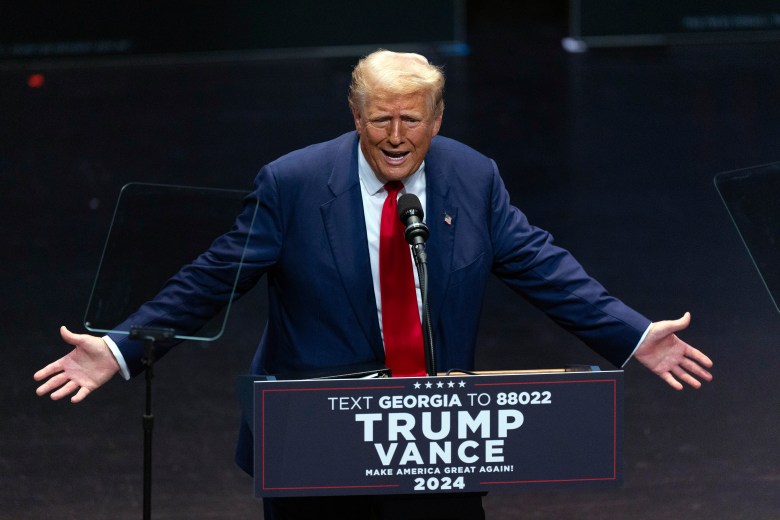An Atlanta-based Black men’s economic advocacy group with a track record of endorsing both Republican and Democratic candidates for public office is throwing its support behind Vice President Kamala Harris in her bid to become the nation’s next president.
Atlanta business leader Omar Ali, a previously registered Democrat-turned independent, is co-founder and president of Justice Equality & Economics (JEEPAC), a Georgia-registered super PAC that claims to have an affiliated voting bloc of more than 50,000 Black men across the state.
With less than seven weeks left until Election Day, Black men have become a central focus for both Harris and former President Donald Trump. JEEPAC’s endorsement of Harris runs counter to the narrative of rising Black male support for the former president, who held a rally in Savannah on Tuesday.
Ali said JEEPAC announced its endorsement of Harris on Monday after conversations with members of her national campaign team revealed, in comparison to Trump, the vice president has a more clearly outlined set of policy proposals aimed at helping Black entrepreneurs.

“The fundamental, most important [issue], in our opinion, is bringing economics back to Black communities and to Black businesses,” Ali told Capital B Atlanta. “[Harris] is the best candidate that will champion some of the policies that we put in front of her to kind of elevate or close the [racial wealth gap] in the United States.”
Ali recently shared an Instagram reel that includes a screenshot of an endorsement thank-you letter signed by Harris for President campaign manager Julie Chavez Rodriguez. The Harris campaign has confirmed the authenticity of the letter with Capital B Atlanta.
“On behalf of the Harris-Walz campaign, I thank the Justice Equality and Economics LLC for your endorsement,” the letter reads.
What is JEEPAC?
Ali said he and his father, Yusef, co-founded JEEPAC eight years ago, when they realized Black Georgians’ overwhelming allegiance to the Democratic Party hasn’t always resulted in ideal economic outcomes in blue cities and counties across the state.
He said JEEPAC drew scorn from some Black leaders in 2022 when the group endorsed GOP Gov. Brian Kemp in his reelection bid against Stacey Abrams.
Ali said when his group engaged Abrams and Kemp during the 2018 election cycle, the Democratic candidate only agreed to support setting aside $10 million to aid minority businesses. He said, in his view, her minority business policy proposals didn’t improve much four years later. Kemp, on the other hand, agreed to support legislation that would increase the share of state government contracts awarded to minority businesses, a move that received bipartisan support among legislators inside the Gold Dome.
[Abrams told Capital B Atlanta in 2022 that she would break up state government contracts into smaller business deals that would allow small businesses to “get a bite at the apple,” in addition to creating a small-business investment fund.]
“Georgia has its first minority bill ever,” Ali said. “Of course, we need to build upon it. It’s not perfect.”
In 2019, Kemp appointed Ali to the State Licensing Board for Residential and General Contractors before reappointing him to the same board earlier this month.
The significance of the Black male vote
Ali noted that Black men remain the Democratic Party’s second-most loyal voting bloc behind Black women. But men, regardless of race, are more likely than women to vote Republican. Trump increased his share of support from Black men by roughly two percentage points in 2020 (20%) when compared to 2016 (18%), according to NBC News. A September NAACP poll showed Trump receiving 26% support from Black men under the age of 50.
Harris has a strong chance to become the first Black woman to serve as commander in chief, but she needs to maximize Black voter turnout to increase her odds of winning the election the way Barack Obama did in historic fashion in 2008. Voter engagement activists in Georgia have reported Harris gaining ground with Black men across the state since replacing President Joe Biden at the top of the Democratic ticket.
If Trump erodes Harris’ Black support in battleground states like Georgia — either by persuading Black voters to back him or simply dissuading them from voting for his opponent — he greatly increases his odds of retaking the Oval Office.
Why endorse Harris?
Ali said conversations with Harris’ campaign team revealed she seems more prepared than Trump to serve the needs of Black entrepreneurs.
That includes advocating for the U.S. Small Business Administration to restore its direct-lending program. Ali said outside of disaster loan assistance, the SBA hasn’t exercised its direct-lending powers to the same degree since 1998, largely due to opposition from influential banking industry lobbying groups like the American Bankers Association.
“African American companies were thriving under SBA direct lending,” Ali said. “We know that’s a hard ask because Democrats and Republicans don’t want that because of the bank lobbyists.”
The Biden-Harris administration has included creating a new SBA direct lending program in its fiscal year 2025 budget request as a means to increase access to capital for small business owners.
What about Trump?

Trump has faced criticism for using stereotypes like golden sneakers and mugshot photos instead of policy proposals to appeal to Black voters. The former president campaigned in Savannah on Tuesday, a city that has a roughly 52% Black population, according to U.S. Census data.
Ali said conversations his team has had with Trump campaign surrogates regarding programs and benefits for nonwhite business owners have resulted in invitations to pose for pictures during local Trump campaign stops, but no specific policy plans.
“We spoke to a couple people on [Trump’s campaign] team. It was just 100% rhetoric,” Ali said. “We couldn’t get anything tangible.”
Trump’s campaign team hasn’t responded to multiple emails requesting comment.


